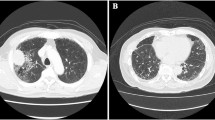Abstract
Sunitinib, a tyrosine kinase inhibitor targeting vascular endothelial growth factor receptors (VEGFRs), has become essential for treating imatinib-resistant malignant gastrointestinal stromal tumor. Recently, several cases have been reported that showed proteinuria and kidney dysfunction to be associated with anti-VEGF therapy. Although previous reports indicated that this side-effect is reversible, it is not well understood. We present here the case of a 72-year-old man who presented with nephrotic syndrome and renal dysfunction 6 months after administration of sunitinib. Sunitinib was discontinued, and nephrotic syndrome remitted spontaneously, but renal function recovery was limited. Nine months later, a renal biopsy was performed because sunitinib was again required and pathological examination was needed. The renal biopsy showed marked endothelial cell injury with focal segmental glomerulosclerosis and accelerated VEGF expression by podocytes. Sunitinib was then given at a reduced dose. Kidney dysfunction and nephrotic syndrome are rare but serious complications of sunitinib. The present case suggests that long-term treatment with a high dose of sunitinib can cause irreversible renal dysfunction, and that low-dose treatment makes these side-effects manageable.


Similar content being viewed by others
References
Rock EP, Goodman V, Jiang JX, et al. Food and drug administration drug approval summary: sunitinib malate for the treatment of gastrointestinal stromal tumor and advanced renal cell carcinoma. Oncologist. 2007;12:107–13.
Demetri GD, van Oosterom AT, Garrett CR, et al. Efficacy and safety of sunitinib in patients with advanced gastrointestinal stromal tumor after failure of imatinib: a randomized controlled trial. Lancet. 2006;368:1329–38.
Eremina V, Jefferson JA, Kowalewska J, et al. VEGF inhibition and renal thrombotic microangiopathy. N Engl J Med. 2008;358:1129–36.
Bollée G, Patey N, Cazajous G, et al. Thrombotic microangiopathy secondary to VEGF pathway inhibition by sunitinib. Nephrol Dial Transpl. 2009;24:682–5.
Winn SK, Ellis S, Savage P, Sampson S, March JE. Biopsy-proven acute interstitial nephritis associated with the tyrosine kinase inhibitor sunitinib: a class effect? Nephrol Dial Transpl. 2009;24:673–5.
Costero O, Picazo ML, Zamora P, Romero S, Martinez-Ara J, Selgas R. Inhibition of tyrosine kinases by sunitinib associated with focal segmental glomerulosclerosis lesion in addition to thrombotic microangiopathy. Nephrol Dial Transpl. 2010;25:1001–3.
Rolleman EJ, Weening J, Betjes MGH. Acute nephritic syndrome after anti-VEGF therapy for renal cell carcinoma. Nephrol Dial Transpl. 2009;24:2002–3.
Chen YS, Chen CL, Wang JS. Nephrotic syndrome and acute renal failure apparently induced by sunitinib. Case Rep Oncol. 2009;2:172–6.
Matsuo S, Imai E, Horio M, et al. Revised equations for estimated GFR from serum creatinine in Japan. Am J Kidney Dis. 2009;53:982–92.
Wu S, Kim C, Bear L, Zhu X, et al. Bevacizumab increases risk for severe proteinuria in cancer patients. J Am Soc Nephrol. 2010;21:1381–9.
George BA, Zhou XJ, Toto R. Nephrotic syndrome after bevacizumab: case report and literature review. Am J Kidney Dis. 2007;49:e23–9.
Izzedine H, Massard C, Spano JP, Goldwasser F, Khayat D, Soria JC. VEGF signaling inhibition-induced proteinuria: mechanisms, significance and management. Eur J Cancer. 2010;46:439–48.
Gurevich F, Perazella MA. Renal effects of anti-angiogenesis therapy: update for the internist. Am J Med. 2009;122:322–8.
Goldberg RJ, Nakagawa T, Johnson RJ, Thurman JM, et al. The role of endothelial cell injury in thrombotic microangiopathy. Am J Kidney Dis. 2010;56:1168–74.
Maynard SE, Min JY, Merchan J, et al. Excess placental soluble fms-like tyrosine kinase 1 (sFlt1) may contribute to endothelial dysfunction, hypertension, and proteinuria in preeclampsia. J Clin Invest. 2003;111:649–58.
Motzer RJ, Michaelson MD, Redman BG, et al. Activity of SU11248, a multitargeted inhibitor of vascular endothelial growth factor receptor and platelet-derived growth factor receptor, in patients with metastatic renal cell carcinoma. J Clin Oncol. 2006;24:16–24.
Kappers MHW, Smedts FMM, Horn T, et al. The vascular endothelial growth factor receptor inhibitor sunitinib causes a preeclampsia-like syndrome with activation of the endothelin system. Hypertension. 2011;58:295–302.
Overkleeft ENM, Goldschmeding R, van Reekum F, Voest EE, Verheul HMW. Nephrotic syndrome caused by the angiogenesis inhibitor sorafenib. Ann Oncol. 2010;21:184–5.
Acknowledgments
We thank the Biobank division of Advanced Medical Research Center, Yokohama City University, for kindly providing the control renal tissue for VEGF staining.
Conflict of interest
The authors have declared that no conflict of interest exists.
Author information
Authors and Affiliations
Corresponding author
About this article
Cite this article
Takahashi, D., Nagahama, K., Tsuura, Y. et al. Sunitinib-induced nephrotic syndrome and irreversible renal dysfunction. Clin Exp Nephrol 16, 310–315 (2012). https://doi.org/10.1007/s10157-011-0543-9
Received:
Accepted:
Published:
Issue Date:
DOI: https://doi.org/10.1007/s10157-011-0543-9




